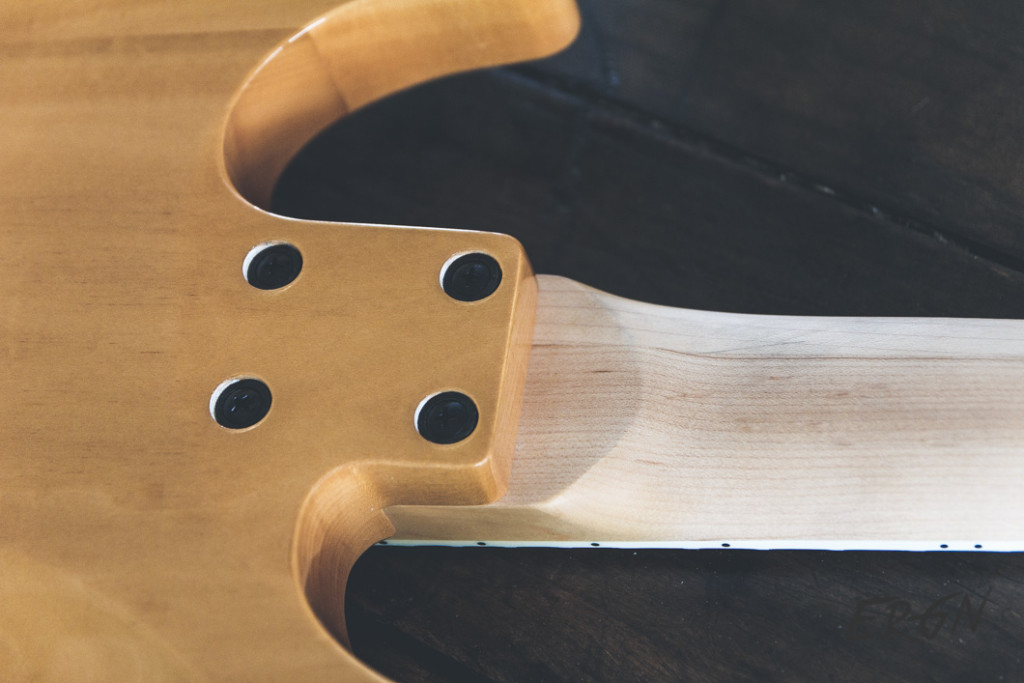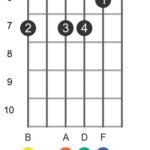The Jackson JS32 Dinky 7-string guitar emerges as a popular choice for players venturing into extended range instruments without breaking the bank. As a content creator for guitarplayers.net, I’ve had my hands on countless guitars, from budget-friendly to high-end masterpieces. Skepticism often creeps in when dealing with entry-level models, especially those crafted overseas with a modest price tag. However, the Jackson JS32 Dinky aims to defy these expectations, promising Jackson’s signature playability and aggressive aesthetics to aspiring 7-string shredders. Could this Indonesian-made guitar, typically priced around $399 or €320, truly deliver a worthwhile experience for beginners or even serve as a reliable backup for seasoned players? Let’s dive deep into the Jackson JS32 Dinky and uncover its strengths and weaknesses.
Jackson JS32 Dinky: Unpacking the Specs and Features
Before we delve into the playing experience, let’s examine the specifications sheet of the Jackson JS32 Dinky. Understanding the components gives us a foundational perspective on what this guitar is all about.
- Body Material: Basswood with Quilt Maple Top
- Neck: 3-Piece Bolt-On Maple with Graphite Reinforcement
- Scale Length: 26.5″
- Fretboard: Rosewood
- Fretboard Radius: 12″-16″ Compound Radius
- Frets: 24 Jumbo
- Bridge: Jackson HT7 String Hardtail
- Pickups: Jackson High-Output 7-String Humbuckers
- Controls: Volume, Tone, 3-Way Blade Switch
- Tuners: Jackson Sealed Die-Cast
- Hardware Finish: Black
These specs reveal a guitar designed for modern rock and metal genres. The basswood body, often favored for its balanced tonal characteristics and lightweight nature, is capped with a quilt maple top for visual appeal. The 26.5″ scale length is crucial for 7-string guitars, providing comfortable string tension for lower tunings. The inclusion of graphite reinforcement in the maple neck aims to enhance stability, while the compound radius fretboard is a welcome feature, promising comfortable chording in the lower registers and effortless soloing higher up the neck. Jackson’s high-output humbuckers suggest a focus on aggressive tones suitable for heavier music styles.
First Impressions: Aesthetics, Build Quality, and Initial Feel
My evaluation unit arrived in the Natural finish – while I personally lean towards the Tobacco Burst, the Natural finish still showcased the quilted maple top reasonably well. The initial visual impression is surprisingly positive for a guitar in this price range. Even though the quilt maple is a thin veneer, it adds a touch of class, and the recessed Volume and Tone knobs are a detail often overlooked in entry-level instruments. This subtle feature indicates a higher level of attention to detail than one might expect.
The “Hipshot-style” hardtail bridge immediately felt solid and comfortable under the palm. It’s worth noting that the reviewer in the original article even preferred it to the bridge on a more expensive LTD AW-7 guitar. This highlights that Jackson hasn’t skimped on essential hardware components for the JS32 Dinky.
However, a minor aesthetic point of contention was the presence of pickup rings on the Natural finish model, while they were absent on the Tobacco Burst version. This is a subjective detail, and some players may prefer pickup rings, but for a streamlined, modern metal look, direct-mounted pickups (without rings) are often favored.
 Jackson JS32-7 Dinky Natural Finish Body Back Detail
Jackson JS32-7 Dinky Natural Finish Body Back Detail
The back of the Jackson JS32-7 Dinky in Natural finish reveals the basswood body and bolt-on neck construction, showcasing the guitar’s straightforward and functional design.
Moving to the neck, the JS32 Dinky truly starts to shine. The thin profile, combined with a flat D-shape, immediately feels conducive to fast playing. The 26.5″ scale length, a personal preference for many 7-string players, contributes to comfortable string tension and clarity, especially in lower tunings. The matte finish on the neck is a welcome touch, providing a smooth, natural feel that enhances playability and prevents the sticky sensation sometimes found on gloss-finished necks. This neck finish is reminiscent of higher-end Jackson models like the DKA8, suggesting a trickle-down of premium features to the JS series.
The fretwork is described as “decent enough,” which is a realistic assessment for a guitar at this price point. While not flawless, it’s functional and unlikely to hinder a beginner’s progress. The 24 jumbo frets are standard fare for modern metal guitars and feel as expected, facilitating bends and vibrato.
Jackson has opted for a relatively dark rosewood for the fretboard, which adds a touch of visual richness. Paired with the distinctive Piranha inlays, the neck has an overall appealing aesthetic that belies its entry-level status.
The tuners are acknowledged as “alright,” but not exceptional. They are functional for initial use, but upgrading them to locking tuners might be a worthwhile consideration for players seeking enhanced tuning stability, particularly for live performances or frequent string changes.
Examining the back of the guitar, the reviewer noted an unusual piece of flamed basswood in the body construction of their specific unit. This is likely an anomaly and not representative of typical JS32 Dinky bodies, which are usually multi-piece basswood. However, it highlights the variability in wood grain and appearance that can occur with mass-produced guitars.
The bolt-on neck joint is a classic Jackson design, known for its robust construction. While it’s not the most ergonomic for accessing the highest frets compared to set-neck or neck-through designs, it’s a durable and functional joint. The reviewer mentions preferring the flattened neck joint found on models like the DKA8, but acknowledges that the standard Jackson bolt-on joint is still perfectly usable and has been employed by countless accomplished players.
Sound and Playability: Punching Above Its Weight?
The most critical aspect of any guitar review is its sound and playability. The Jackson JS32 Dinky, despite its entry-level designation, manages to deliver a surprisingly competent performance in both areas.
Plugging the JS32 Dinky into a Kemper profiling amp, the reviewer initially had low expectations for the Jackson high-output humbuckers. However, the guitar produced a sound that was “definitely good enough for beginners” right out of the box. The pickups are described as lacking some bass response, and the lower frequencies are characterized as slightly “mushy.” Despite these limitations, the overall tonal quality is deemed “absolutely okay” considering the guitar’s price point.
For players intending to use the JS32 Dinky in live performance settings, upgrading the pickups is recommended. Pickups with enhanced low-end response would likely be beneficial for achieving a fuller, more impactful 7-string tone. While considering pickup upgrades, also swapping out the stock potentiometers and electronics could further refine the guitar’s sonic capabilities. However, for practice, rehearsals, and initial exploration of 7-string playing, the stock pickups are more than adequate.
In terms of playability, the JS32 Dinky excels, particularly due to its neck profile and compound radius fretboard. The thin, fast neck is comfortable for shredding and intricate riffing, while the compound radius facilitates both comfortable chording and smooth lead playing across the fretboard. The 26.5″ scale length contributes to a balanced feel, neither too tight nor too loose, making it suitable for a range of playing styles and tunings.
Verdict: A Solid Foundation for 7-String Exploration
The Jackson JS32 Dinky 7-string guitar emerges as a genuinely impressive entry-level instrument. It surpasses expectations for a guitar in its price range, offering a comfortable playing experience, aggressive aesthetics, and a sound that is more than serviceable for beginners.
Who is the Jackson JS32 Dinky for?
- Beginner 7-string players: This guitar is an excellent starting point for those venturing into the world of 7-string guitars. It provides a comfortable and playable platform to learn extended range techniques without a hefty investment.
- Budget-conscious metal and rock players: If you’re looking for an affordable 7-string guitar capable of handling heavier genres, the JS32 Dinky is a strong contender.
- Players seeking a backup guitar: With a few strategic upgrades, the JS32 Dinky can transform into a reliable and gig-worthy backup instrument for more experienced players.
Pros:
- Exceptional playability, especially the neck profile and compound radius fretboard.
- Aggressive Jackson aesthetics.
- Decent stock pickups for practice and beginners.
- Solid hardware, including the “Hipshot-style” bridge.
- Excellent value for money.
Cons:
- Stock pickups may lack bass response and clarity for professional use.
- Tuners are functional but not high-end.
- Fretwork is decent but not exceptional.
- Some may find the bolt-on neck joint less ergonomic for high fret access.
Conclusion:
The Jackson JS32 Dinky is a highly recommendable entry-level 7-string guitar. It provides a solid foundation for players to explore the expanded range of a 7-string instrument without compromising playability or breaking the bank. While upgrades to pickups and tuners could elevate its performance further, the JS32 Dinky is an outstanding value proposition straight out of the box and a testament to Jackson’s commitment to providing quality instruments at all price points.
[

